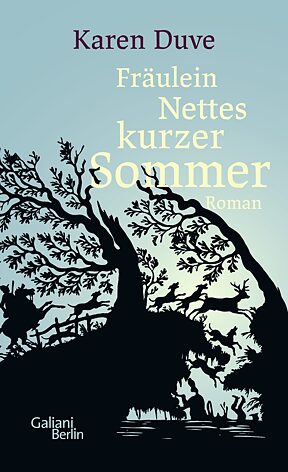Karen Duve
Fräulein Nettes kurzer Sommer
[Fraulein Nette’s Brief Summer]
- Galiani Berlin Verlag
- Berlin 2018
- ISBN 978-3-86971-138-6
- 592 Pages
- Publisher’s contact details
Sample translations
The Rebel Betrayed
In an almost 600-page yet highly entertaining mixture of historical epic, artist novel, family saga and moral portrait, Karen Duve examines not one but three summers in the life of Droste, known to her friends as “Fräulein Nette.” The title refers metaphorically to the brief summer of her life as a woman, which ended in her early twenties. The focus of this work is not on how the Westphalian baroness became a poet and composer (because she was that too) but what she herself referred to as the “catastrophe of her youth”: the infamous plotting of an envious and misogynous society which attempted to put this rebellious and unconventional young lady in her place, having a profound influence on the subsequent course of her life.
Years of research, an audacious attempt to put herself in someone else’s shoes and no small measure of feminist solidarity form the basis of Duve’s case study, which she embeds in a sharply drawn, often wickedly amusing panorama of characters. At the center is Fräulein Nette, ever-ailing and physically unappealing, yet extremely clever, cultured and quick-witted, the reason why some perceived her as a “nuisance.” We see her surrounded by extended family, by friends and acquaintances in the houses of the Westphalian nobility, and furthermore by the intellectuals and writers of her day, from the Grimm Brothers to Schopenhauer, from Hegel to young Heine. And finally the university students of Göttingen, wildly eccentric or fiercely nationalist, whose lively debates “Fräulein Nette” took part in and in whose company she also met the two gentlemen who would abuse her tender feelings on behalf of a scheming uncle, compromising her in a lasting way – a fate which in those days was tantamount to being condemned to eternal spinsterhood. But instead of resigning herself to playing the victim Annette von Droste-Hülshoff created a work that secured her a place in literary history.
Karen Duve has captured all this in a seemingly effortless prose that is neither stilted nor artificially modern, consistent even in her dialogues, and retaining a wonderful balance between empathy and irony. The fact that the focus is not on Droste’s literary work but on the environment she lived in, on her personal fate and fortunes, makes the book all the more suitable for translation, the linguistic gap of two centuries being rendered inconsequential.
Translated by David Burnett

By Kristina Maidt-Zinke
Kristina Maidt-Zinke is a book and music critic at the Süddeutsche Zeitung and also writes reviews for Die Zeit.
Publisher's Summary
A young poetess who refuses to toe the line and a disastrous emotional entanglement – Karen Duve’s mercilessly realistic account of Annette von Droste-Hülshoff’s life story
Twenty-three years old, fierce, stubborn and sassy, Fräulein Nette is the black sheep that refuses to fit in with the herd of her aristocratic relatives. While her aunts and cousins sit dutifully by the fireplace embroidering, she ventures into the marl pits armed with a pickaxe to quarry for minerals. The hems of her dresses are basically perpetually soiled. But the worst thing is her sharp tongue. When her uncle August’s artist friends come to Bökerhof to talk about art and politics, she weighs in, uninvited. The mere sight of her sends Wilhelm Grimm, on whom she has bestowed the nickname “Unwill,” into a panic. She is an enfant terrible – though apparently not in everyone’s eyes. Heinrich Straube, the brilliantly eccentric heart of the Göttingen guild of poets, for one, finds his best friend’s niece extremely compelling. And his overtures to her in the family greenhouse remain anything but unreciprocated. But he isn’t the only one. What ensues is a romantic catastrophe with a familial conflagration.
(Text: Galiani Berlin Verlag)
